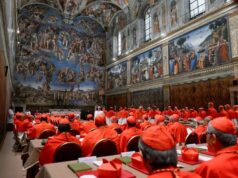Maldives Speaker Calls Cab India’s Internal Matter Says Maldives Speaker

The Speaker of Maldives Parliament Mohamed Nasheed who is leading a parliamentary delegation of his country, termed the Citizenship (Amendment) Bill India’s internal matter and said, “I believe whatever that comes out from the process would be what the vast majority in India would agree upon.” He is also the Former President of the Country.
Mohamed Nasheed is currently in New Delhi at the joint invitation of Rajya Sabha Chairman M Venkaiah Naidu and Lok Sabha Speaker Om Birla. He spoke on a host of issues ranging from the next venue of the SAARC summit to the Maldives’ ‘India First policy’.
Mohamed Nasheed said that he was in Parliament during the passage of the Citizenship (Amendment) Bill. He said, “I trust Indian democracy, its processes and its systems. I was in Parliament when it happened. I believe whatever that comes out from the process would be what the vast majority in India would agree upon. It is internal to India.”
To a question of the ramifications the CAB could have on other regional neighbours such as Afghanistan, Bangladesh and Pakistan and if the bill was discriminatory in defining “minority persecution”, Mohamed Nasheed said: “I don’t think it is a foreign policy matter in that sense. Religious persecution is wrong. India, I believe, will always give refuge to anyone who is persecuted… These were founding ideas of India, secular idea, respecting minorities. It is very difficult for me to comment on the India, Pakistan, Bangladesh issue.”
“In 1947, this [India] country became two and later broke into three. To start with, it is your thing. We are back in the middle of the Indian Ocean. Don’t think it is a foreign policy matter in that sense. Religious persecution is wrong. India, I believe, will always give refuge to anyone who is persecuted,” he said.
According to the amended Citizenship Act members of the Hindu, Christian, Sikh, Buddhist and Zoroastrian communities, who have come from Pakistan, Afghanistan, and Bangladesh till December 31, 2014, and were facing religious persecution there, will not be treated as illegal immigrants and granted Indian citizenship.
Mohamed Nasheed has proposed that the next SAARC summit be held in Malé.
Speaking to India Today in New Delhi, Mohamed Nasheed said, “We need to talk to all SAARC nations — India, Bangladesh, Bhutan, Pakistan, Sri Lanka, Afghanistan, Nepal and Bhutan. We must find a mechanism to do that. It is always on the venue that these issues come and get stuck. In my view, you can always come to the Maldives. Come to the Maldives.”
When asked if the venue for the summit which was to be held in Islamabad should be shifted to Maldives, Mohamed Nasheed said, “We should hold the summit there. I am okay with the shift.”
The proposal comes at a time when the 19th SAARC Summit, which was to take place in Islamabad in 2016, is yet to be held.
It was called off after the terrorist attack on an Indian Army camp in Uri in Jammu and Kashmir on September 18 that year. India had expressed its inability to participate in the summit due to “prevailing circumstances”.
Bangladesh, Bhutan and Afghanistan had also declined to participate in the Islamabad meet.
On the Maldives’ government’s ‘India First’ policy, Mohamed Nasheed said:”It is difficult not to say now that there is a Cold War brewing in the Indian Ocean. Sitting where I am, it is obvious. We don’t like to be sandwiched between the two. But, we have an India First policy,” he said.
The Maldives is very clear to stop all those projects and hold the government, Chinese and the previous administration, accountable. However, Mohamed Nasheed affirmed that his country will not default on payments, hoping that China will come up with a better way to deal with the situation.
“We couldn’t default. We can’t say we will not pay. We will get into all sorts of problems. We do expect the Chinese government to understand what I am saying. Please listen to me. This was not assistance. If I can’t pay back, you shouldn’t have given it. In that case, you should give a grant”, said Mohamed Nasheed.
Mohamed Nasheed criticised Beijing’s debt traps and said, “These are loans. They are commercial loans with high interest where the project prices were inflated. Using debt as a leverage is completely wrong and no country should do that.”
Mohamed Nasheed reaffirmed the Maldives’ commitment to stand firm on its pledges and fulfill the manifesto promises though a strategic plan that would involve assistance from India. He said there is no difference of opinion on any count between him and his party or the government. Nasheed is the leader of the ruling MDP in Maldives.
“We come to government with pledges. We get elected because we promise people that we would do certain things. We make a strategic action plan to deliver those plans through legislative agenda that would enable the delivery. Both the party and the government agree with the manifesto and the strategic action plan”, Mohamed Nasheed said.
Mohamed Nasheed said that “Zakir Naik tried to come to the Maldives again but our government refused” as the government “does not want anyone to “preach” hatred.”
“Zakir Naik went to the Maldives once, he hasn’t come after that. They are using a lot of messaging techniques and are very successful in using them. I’m not talking about Islam but about terrorist organisations that want to embed themselves into the Maldives. We don’t want that, we are all good Muslims. Zakir Naik tried to come to the Maldives again but our government refused,” he said.
India is seeking the extradition of Naik, who has been living in Malaysia for the last three years and is facing charges of inciting communal disharmony and committing unlawful activities in India.
Naik is also facing probe both in India and Bangladesh in connection with the terror attack at the Holey Artisan Bakery in Dhaka on July 2016.




